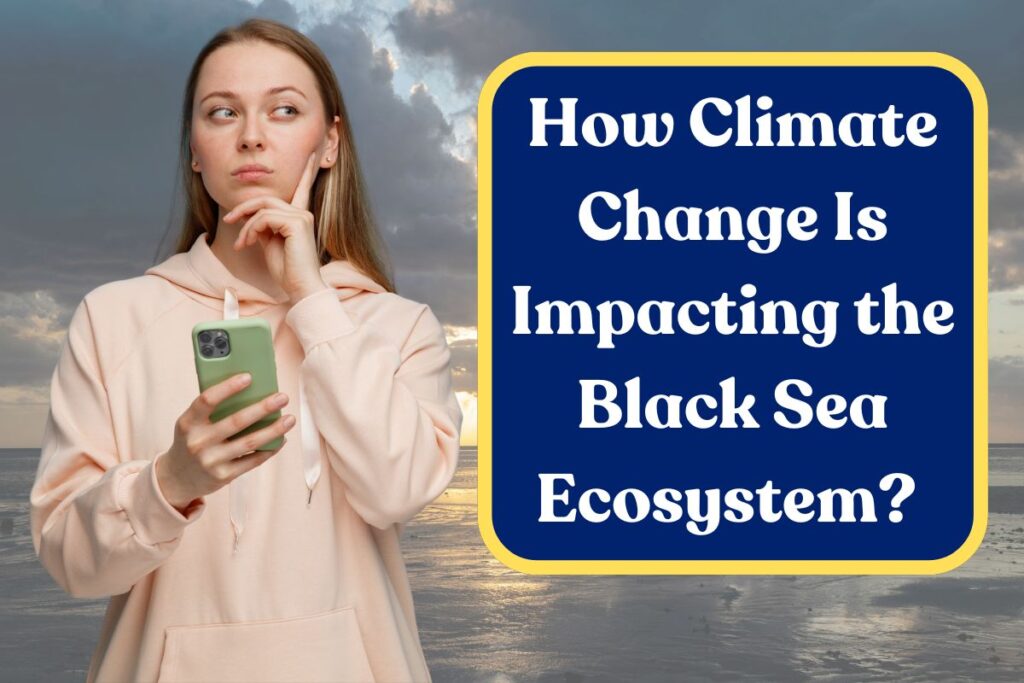The Black Sea that is home to a large number of marine species because of its unique ecosystem has been severely impacting by climate change from the past few decades. There are multiple factors driven by climatic change responsible for impacting the Black Sea Ecosystem negatively.

The factors which are derived from climate change and negatively impacting ecosystem of the Black Sea are rising severity and extreme events, shifts in species distribution, deoxygenation, ocean acidification, increasing water temperature, coastal erosion and others.
How Climate Change Is Impacting the Black Sea Ecosystem
For thousands of years, the Black Sea has facilitated economic and human growth in the area, and today there are over 160 million individuals residing in Ukraine, Bulgaria, Turkey, Georgia, Russia, and Moldova who benefit from the Black Sea marine ecosystem.

Environmental issues keep rising, although the region has taken steps toward overcoming environmental threats from growth and urbanization forces, and defending the Black Sea ecosystem. Pollution pressures, marine debris, and plastic still endanger Black Sea marine ecosystems and livelihoods.
The Black Sea has witnessed an alarming rise in pollution since the last twenty years, becoming Europe’s most polluted sea. So, if you an environmentalist or want full information on the Black Sea ecosystem then this article is for you. In the present article, we will explore how climate change is impacting the Black Sea Ecosystem. In addition to this, the factors which are primarily responsible for ruining the Black Sea ecosystem are also covered in this article.

Key Climatic Factors Which Are Impacting the Black Sea Ecosystem

1. Rising Water Temperature
The Black Water Ecosystem has been facing challenges including Mediterraneanization, biodiversity shifts, and increased stratification and altered circulation due to rising water temperature. As a result of the absorption of excess heat due to global warming, oceans have continued to warm continuously since the 1970s. This process will proceed with the mean temperature 0.88°C warmer during 2011-2020 than during 1850-1900.
The global average sea surface temperature hit a new high of 21.1°C in April 2023. Warming water changes, the metabolisms of organisms. For instance, warming water increases oxygen demand. It can move mobile species and alter their distribution range, thereby changing ecosystem dynamics and food webs, as has happened to most fish species. Marine heat waves are occurrences that can directly kill indigenous species, particularly if they occur in the summer.

One such occurrence took place in the Western Mediterranean Sea in 2003. Apart from being deadly to indigenous species, heatwaves expose habitats to other stresses such as non-indigenous species. These can swiftly fill in the ‘ecological space’ created by the extinction of indigenous species. Non-indigenous species can then become invasive by dominating the ecological niche.
2. Ocean Acidification
Ocean acidification, primarily caused by carbon dioxide emissions, reduces the amount of calcium carbonate available for organisms. This makes it harder for creatures like mollusks, corals, and some kinds of plankton to develop and maintain their skeletons and shells.

With a pH decline of roughly 30%, ocean acidification has been rapidly increasing since the pre-industrial era. It is anticipated that cold water corals in the Black Sea will suffer significant consequences from acidification and the loss of carbonate skeletons.
When ocean acidification affects a species, the effects ripple up the food chain and affect ecosystem services like fisheries. Thus, the impact of ocean acidification is severe on the ecosystem of the Black Sea as it is affecting survival and growth of plankton, disrupting food chains, dissolving and damaging shells and skeletons, and reducing shell formation.
3. Ocean Deoxygenation
Deoxygenation is the reduction of oxygen in sea water that is likely an effect of warming of the ocean. The ocean deoxygenation is occurred because oxygen does not dissolve in warm water, in other words, warm waters contain reduced dissolved oxygen. It happens in addition to augmented consumption of oxygen by different organisms and augmented stratification and ventilation modifications.
Along with an increasing nutrient level that may result from additional precipitation or runoff from heavy agriculture, deoxygenation is likely to result in an increase of hypoxic or anoxic conditions. The following conditions will be fatal to most species, particularly sessile (stationary) marine life.
Hypoxia-affected coastal regions have risen four-fold since the 1950s. In Europe, there is only limited information available for evaluating the loss of oxygen. Out of 9% at the stations that are measuring the EU’s ocean areas, 3% had an improvement trend and 9% had a worsening trend. But for the other 88%, no trend was available. The global ocean will be losing 3-4% of its oxygen by the year 2100. Thus, the Black Sea which already have hypoxic waters will be drastically impacted by the Ocean Deoxygenation.
4. Shifts in Species Distribution
The Black Sea Ecosystem is also facing negative impacts of shifts in species distributions which are caused by climate change. The Black Sea’s marine species, food webs and biodiversity are profoundly impacted by the shifts in species distributions in negative manner.
The major reason because of which a large number of marine species are shifting towards cooler oceans is the rising sea temperatures. It has altered the natural habitat of marine life and certainly disrupted their interactions in the Black Sea.
In addition to this, migration of marine life towards cooler oceans or waters is also impacting the food webs within the Black Sea. The shifts in species distribution is making it difficult for the big fish and other Black Sea’s species to search for food as small fish and plankton are migrating to other cooler regions. Therefore, it may result in declining population of fish species in the Black Sea which are commercially significant.
5. Increased Extreme Weather Events or Conditions
The shores of Black Sea are facing alarming changes because of the effects of the climate change. The powerful storms and sea level increase pose a threat to undermining ecosystems, damaging societies and altering the coastal landscape of this significant area.
Black Sea It is an unusual ecosystem supporting an immense variety of species and human societies that rely upon its shores. Nonetheless, increasing sea levels and extreme weather conditions are exerting unprecedented strain upon this region. Changes in the marine environment impact the biodiversity, urban systems and local economy, exposing millions of people to danger.
| Homepage | blacksea-commission.org |








